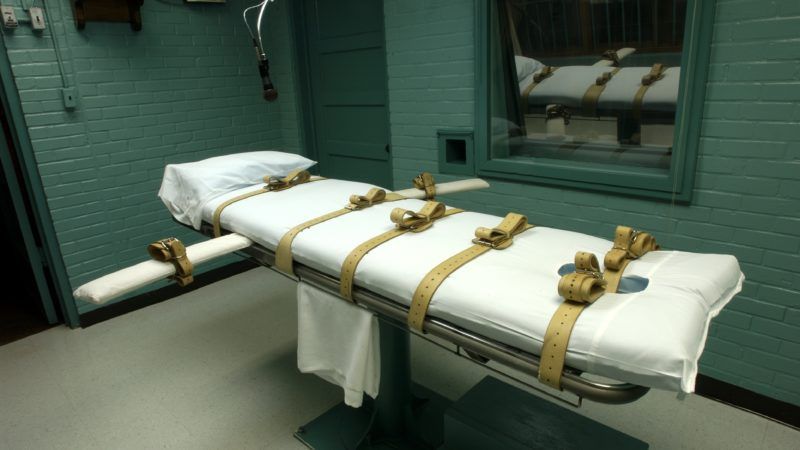Texas Court Rejects Last Appeal for a Man Set To Be Executed Based on Disputed 'Shaken Baby Syndrome' Evidence
Robert Roberson is scheduled to become the first person in the country to be executed based on evidence of what used to be called "shaken baby syndrome."

A Texas appeals court denied a stay of execution today for Robert Roberson, a death row inmate who is scheduled on October 17 to become the first person in the U.S. to be executed based on disputed "shaken baby syndrome" evidence.
The Texas Court of Criminal Appeals, which is the court of last resort for all criminal matters in the state, dismissed Roberson's latest and final petition for a writ of habeas corpus and stay of execution in his long-running capital case.
Roberson was convicted in 2003 of murdering his two-year-old daughter. Roberson claimed that his daughter fell out of bed in the middle of the night, but he calmed her down and eventually got her back to sleep. He says he later woke up and discovered that she had stopped breathing and turned blue. Roberson took his daughter to the hospital, where she was declared brain dead and eventually taken off life-support. Medical examiners found a trio of internal head conditions that were, at the time, considered to be conclusive evidence of violent shaking and impacts.
As Reason detailed in a story last month on the case, Roberson's lawyers argued that the scientific understanding of shaken baby syndrome, now called Abusive Head Trauma (AHT), has shifted dramatically since his conviction. His lawyers also said they had uncovered previously undisclosed medical records that proved Roberson's daughter died of severe viral and bacterial pneumonia, not trauma from shaking or abuse.
Among the believers in Roberson's innocence are the police detective who originally arrested him, who now says there's "unassailable doubt" about Roberson's conviction, and novelist John Grisham.
However, the Texas Court of Criminal Appeals found that the new claims did not meet the standards for filing a subsequent petition for writ of habeas corpus—Roberson was previously granted a stay of execution and additional evidentiary hearings in 2016 but denied relief—and the court dismissed Roberson's new petition without reviewing it on the merits.
"It took years of fighting to get complete medical records," Roberson's lawyer, Gretchen Sween, said in a press release following the court order. "We are devastated by this staggering development but will continue to pursue any avenue to make sure that Mr. Roberson is not the first person in the U.S. executed under the discredited 'Shaken Baby' hypothesis."
Roberson's fateful execution would come amid intense courtroom debate over the reliability of AHT evidence. Prosecutors and pediatric abuse specialists say there's broad scientific consensus around AHT, but innocence groups and advocates for forensic reform have successfully persuaded several state courts otherwise.
According to the National Registry of Exonerations, at least 33 parents and caregivers in 18 states convicted based on AHT evidence have been exonerated.
ProPublica reported yesterday on the case of Russel Maze, a Nashville man sentenced to life in prison for murdering his child. The medical examiner who originally decided Maze's child was a victim of AHT has now recanted his testimony, and the Nashville District Attorney is seeking to overturn Maze's conviction.
Similar cases abound around the country, as I wrote in my previous coverage of Roberson's case:
Earlier this year the Michigan Supreme Court overturned a 2006 murder conviction in the death of an infant and ruled that the defendant deserves a new trial. The court found that the defendant's expert witnesses, including a doctor who had testified for the prosecution at her original trial, had presented enough new evidence during the appeal process for a jury to have reasonable doubt about her guilt.
The Columbus Dispatch reported on two similar cases in Ohio this February. In one, a court dismissed charges in the retrial of a man convicted in 2003 of killing a 2-year-old child, ruling that a "shift in understanding by the medical community" meant there was "a strong probability of a different result on retrial." In the other case, a court ruled that a woman was eligible for compensation for spending 18 years in prison for the alleged shaking death of a child she was babysitting in 2003. Her conviction was overturned after the pathologist who conducted the autopsy recanted.
In New Jersey, the state supreme court is considering whether AHT evidence should be allowed in courtrooms at all, after a state trial court judge barred testimony from AHT experts in a child abuse trial in 2022. The trial court judge wrote that AHT is "an assumption packaged as a medical diagnosis, unsupported by any medical or scientific testing." A state appeals court upheld the ruling, writing that "the very basis of the theory has never been proven."
But none of that was enough to persuade the Texas Court of Criminal Appeals to grant Roberson relief, and now his last chance at avoiding the death penalty lies in a pardon.
"Robert's fate is now at the mercy of the Governor," Sween said. "He and the Texas Board of Pardons and Paroles are the only ones standing in the way of a horrific and irreversible mistake: the execution of an innocent man."


Show Comments (24)